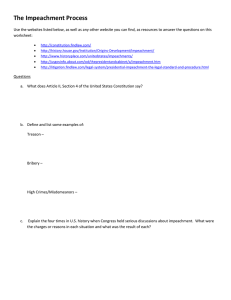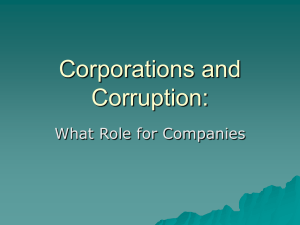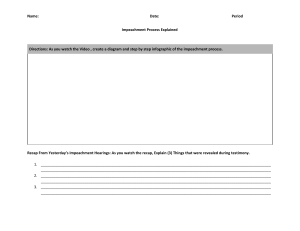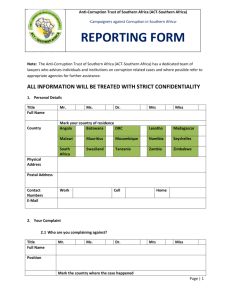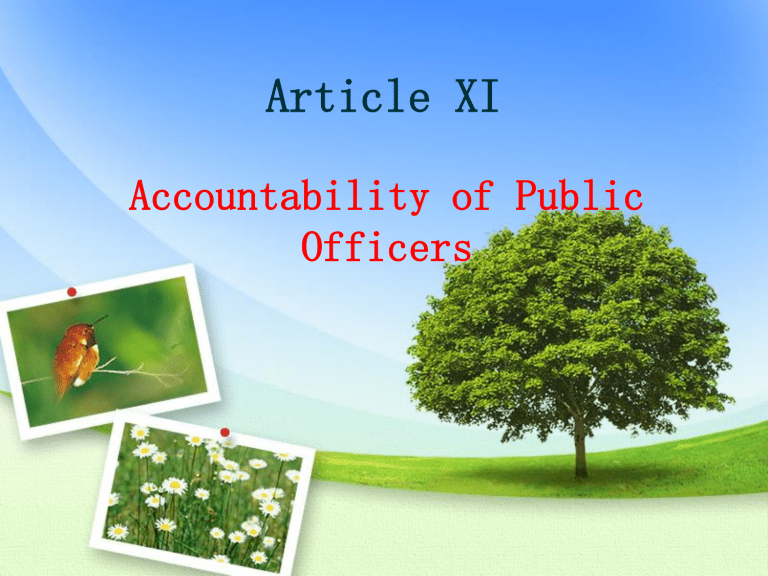
Article XI Accountability of Public Officers Statement of Policy Public Office is a Public Trust. Public officers and employees must at all times be accountable to the people, serve them with utmost responsibility, integrity, loyalty and efficiency, act with patriotism and justice, and lead modest lives. (sec. 1 Art. 11) Impeachment Definition A national inquest into the conduct of public men. Impeachable Officers President Vice-President Chief Justices and Associate Justices of the Supreme Court Chairmen and Members of the Constitutional Commissions Ombudsman Grounds for Impeachment Culpable Violation of the Constitution Treason Bribery Graft and Corruption Other High Crimes or Betrayal of Public Trust Procedure for Impeachment Initiating Impeachment Case Limitation on Initiating of Impeachment Case Trial and Decision Effect of Conviction The Sandiganbayan The present anti-graft court Its decision is reviewable by the Supreme Court on a petition for Certiorari. The Ombudsman Known as the Tanodbayan Qualifications: Natural-born citizen of Ph 40 years of age Recognized probity and independence Member of the Philippine Bar Must not have been a candidate of any elective office in the immediately preceding election Must have been a judge or engaged in the practice of law for 10 years or more Term of Office 7 years without reappointment Ill-gotten wealth means any asset, property, business enterprise or material possession of any person within the purview of Section two (2) hereof, acquired by him directly or indirectly through dummies, nominees, agents, subordinates and/or business associates by any combination or series of the following means or similar schemes: 1. Through misappropriation, conversion, misuse, or malversation of public funds or raids on the public treasury; 2. By receiving, directly or indirectly, any commission, gift, share, percentage, kickbacks or any/or entity in connection with any government contract or project or by reason of the office or position of the public officer concerned; 3. By the illegal or fraudulent conveyance or disposition of assets belonging to the National government or any of its subdivisions, agencies or instrumentalities or governmentowned or controlled corporations and their subsidiaries; 4. By obtaining, receiving or accepting directly or indirectly any shares of stock, equity or any other form of interest or participation including the promise of future employment in any business enterprise or undertaking; 5. By establishing agricultural, industrial or commercial monopolies or other combinations and/or implementation of decrees and orders intended to benefit particular persons or special interests; or 6. By taking undue advantage of official position, authority, relationship, connection or influence to unjustly enrich himself or themselves at the expense and to the damage and prejudice of the Filipino people and the Republic of the Philippines. Statement of Assets, Liabilities, and Net Worth Thank You Public Office is a Public Trust Public Office A public office is the right, authority and duty created and conferred by law, by which for a given period, either fixed by law or enduring at the pleasure of the appointing power, an individual is invested with some portion of the sovereign functions of the government, to be exercised by him for the benefit of the public. (Fernandez vs Sto. Tomas) Public Office is a Public Trust Public Officer A person who holds public office. Back Culpable Violation of the Constitution the deliberate and wrongful breach of the Constitution. back Treason According to the Revised Penal Code, treason is defined as “Any Filipino citizen who levies war against the Philippines or adheres to her enemies, giving them aid or comfort within the Philippines or elsewhere.” back Bribery The Revised Penal Code defines bribery in two forms: Direct bribery is “committed by any public officer who shall agree to perform an act constituting a crime, in connection with the performance of this official duties, in consideration of any offer, promise, gift or present received by such officer, personally or through the mediation of another.” Indirect bribery is “committed by a public officer when he accept gifts offered to him by reason of his office.” back Graft and corruption Any violation of the Republic Act No. 3019, or the Anti-Graft and Corrupt Practices Act is an impeachable offense. Technically, corruption covers an entire host of abuses, of which graft is one. Graft and corruption are charges that are typically leveled at highly-placed government officials, who are able to use public funds to improve their own fortunes due to increased access, influence, knowledge or power that comes with an elevated position. An official engaging in bribery, nepotism, embezzlement, extortion or graft is guilty of abuse of public trust at minimum, and may often be charged with a crime. back Other high crimes or betrayal of public trust In Francisco Jr. vs. Nagmamalasakit na mga Manananggol ng mga Manggagawang Pilipino, Inc., the Supreme Court purposely refused to define the meaning of “other high crimes or betrayal of public trust,” saying that it is “a non-justiciable political question which is beyond the scope of its judicial power.” However, the Court refuses to name which agency can define it; the Court impliedly gives the power to the House of Representatives, which initiates all cases of impeachment. back Certiorari It is a writ issued from a superior court requiring a lower court or a board, or officer exercising judicial functions to transmit the records of a case to the superior court for purposes of review. back
